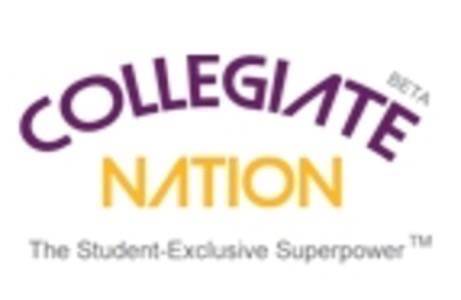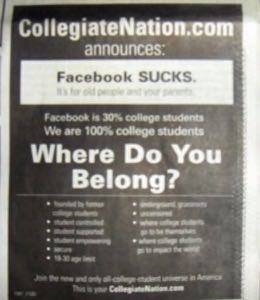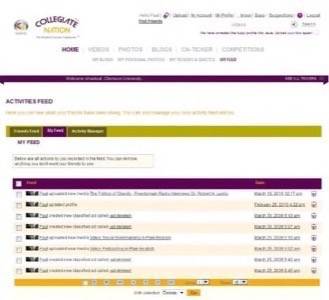Remember when you had to have an @edu email address to gain entry into Facebook’s once-closed social network? Those days are no more, but a new social network pitching itself as a “Facebook alternative” wants to bring that level of privacy back to today’s students. Collegiate Nation, a site that has been in development since 2007, is now poised to take advantage of the recent Facebook privacy debacle with the launch of a new network for college students only.

Besides the network’s exclusivity, there are three other factors that could make it an easy sell for those looking for a way out of the Facebook rat race. According to mom-turned-entrepreneur Evelyn Castillo-Bach, the woman behind the network’s creation, Collegiate Nation’s three main pillars are: Privacy, No Advertisements and Total User Control.
Fed Up with Facebook, Mom Becomes Unlikely Entrepreneur
It was hard to not be intrigued when the news of what appears to be a viable Facebook alternative, at least for the college student demographic, appeared in our inbox. Founder Castillo-Bach (not just a mom, but also a professionally trained journalist) reached out to us with a rather interesting story of a little-known network called Collegiate Nation.
Fed up with trying to control her own personal data on Facebook, she decided to create a new social network while her sons were both still in college. After seeing how her sons shared info among their friends, not realizing how that private data was being used, publicized and controlled, not only by Facebook, but also by third parties, her passion was ignited. “I feel strongly that college students should have the freedom and power to freely communicate with each other without advertisers, parents, professors and future employers poking into their social world or views,” she said.
In fall of 2009, Collegiate Nation began grassroots-style promotions, but is still relatively unknown among most college students, admits Castillo-Bach.
However, the site has a lot to offer those who join, including the following:
- It’s Student-Only: the website is exclusively for college students. You must have an @edu address to join. You must be 18-30 years old. Professors, faculty and staff who try to sneak in are in violation of the Terms and Conditions, an “UNLAWFUL ACT subject to prosecution,” warns the sign-up form. The site even retains the right to request that members upload their student ID in the future if their student status is in question.
- Privacy: Members of the site own and control all their information and submissions, including posts, photos, videos, blogs, comments and more.
- No Ads: No ads, marketers, data mining or third-party apps will be permitted. The one exception is a page called AdWord, but it only shows ads from student organizations.
Collegiate Nation’s Business Model: Tiered Access
Without advertising, Collegiate Nation needed a business model. The one it chose is tiered levels of access. Facebook may be free, but “Free is not really free,” this page on Collegiate Nation’s website reminds you. On Facebook, you’re “paying” with your personal information and private data.
During its beta period, the site remains free for everyone. Later on, free users will no longer have access to the entertainment side of the website, but can continue to post stories, videos and photos. However, they will be locked out of areas like the music and art exchange area, the book swapping site, private groups, the breaking news section (Collegiate Nation also includes a Citizen Journalism component) and more. The free-vs.-paid comparison chart here has additional details.
The rates for “citizenship” – that is, the paid level of access – are reasonable: $1.50/week payable in monthly installments of $6/month. A discounted yearly rate is also available at $45.00, which means members get five months free.
The Grassroots Campaign
So far, the advertising initiatives for Collegiate Nation have only included a couple of college newspaper and radio ads – the company is hoping that word-of-mouth will help spread the news.

In researching the site via the Web, we happened across this student review, which seems promising:
“I think that this site is a very interesting concept, giving students a place to learn from and network with each other; a place where we become the media and can decide what’s newsworthy to us,” writes Kim Rodia, a senior at Kent State University. “I especially like the fact that I have the ability to completely control who sees my information and can post anonymously if I’d like.”
But it’s Not Facebook…
One caveat, Collegiate Nation is not Facebook. The site’s design looks like something out of a bygone era, not a polished and professional creation like Facebook…or even MySpace, for that matter. But its homegrown look-and-feel may actually help it sell itself as the other Facebook – the private, secret one.
The site isn’t the first Facebook alternative we’ve heard about lately. Last week, we broke the news of the open social network initiative called Diaspora, being built by four college students. We were happy to see The New York Times later pick up the news, as that helped share the students’ efforts with a wider audience.
We expect that Diaspora and Collegiate Nation won’t be the last to enter this space, either. For many folks, Facebook has jumped the proverbial shark. New outlets promoting privacy will appeal to those who have had enough of Facebook’s callous changes with regard to what many still consider private data. Will Collegiate Nation succeed? It’s far too soon to tell, but it’s certainly worth watching.























